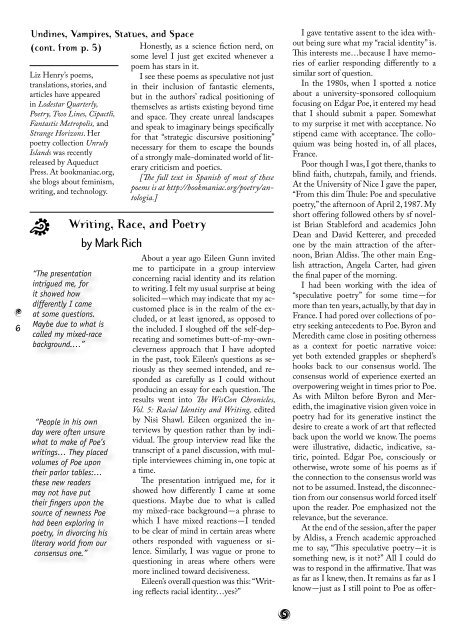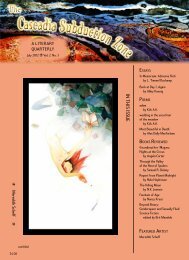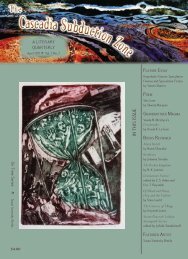Subduction
REviEwEd - The Cascadia Subduction Zone
REviEwEd - The Cascadia Subduction Zone
- No tags were found...
Create successful ePaper yourself
Turn your PDF publications into a flip-book with our unique Google optimized e-Paper software.
H<br />
6<br />
Undines, Vampires, Statues, and Space<br />
(cont. from p. 5)<br />
Liz Henry’s poems,<br />
translations, stories, and<br />
articles have appeared<br />
in Lodestar Quarterly,<br />
Poetry, Two Lines, Cipactli,<br />
Fantastic Metropolis, and<br />
Strange Horizons. Her<br />
poetry collection Unruly<br />
Islands was recently<br />
released by Aqueduct<br />
Press. At bookmaniac.org,<br />
she blogs about feminism,<br />
writing, and technology.<br />
y<br />
Writing, Race, and Poetry<br />
by Mark Rich<br />
“The presentation<br />
intrigued me, for<br />
it showed how<br />
differently I came<br />
at some questions.<br />
Maybe due to what is<br />
called my mixed-race<br />
background.…”<br />
“People in his own<br />
day were often unsure<br />
what to make of Poe’s<br />
writings… They placed<br />
volumes of Poe upon<br />
their parlor tables:…<br />
these new readers<br />
may not have put<br />
their fingers upon the<br />
source of newness Poe<br />
had been exploring in<br />
poetry, in divorcing his<br />
literary world from our<br />
consensus one.”<br />
Honestly, as a science fiction nerd, on<br />
some level I just get excited whenever a<br />
poem has stars in it.<br />
I see these poems as speculative not just<br />
in their inclusion of fantastic elements,<br />
but in the authors’ radical positioning of<br />
themselves as artists existing beyond time<br />
and space. They create unreal landscapes<br />
and speak to imaginary beings specifically<br />
for that “strategic discursive positioning”<br />
necessary for them to escape the bounds<br />
of a strongly male-dominated world of literary<br />
criticism and poetics.<br />
[The full text in Spanish of most of these<br />
poems is at http://bookmaniac.org/poetry/antologia.]<br />
About a year ago Eileen Gunn invited<br />
me to participate in a group interview<br />
concerning racial identity and its relation<br />
to writing. I felt my usual surprise at being<br />
solicited — which may indicate that my accustomed<br />
place is in the realm of the excluded,<br />
or at least ignored, as opposed to<br />
the included. I sloughed off the self-deprecating<br />
and sometimes butt-of-my-owncleverness<br />
approach that I have adopted<br />
in the past, took Eileen’s questions as seriously<br />
as they seemed intended, and responded<br />
as carefully as I could without<br />
producing an essay for each question. The<br />
results went into The WisCon Chronicles,<br />
Vol. 5: Racial Identity and Writing, edited<br />
by Nisi Shawl. Eileen organized the interviews<br />
by question rather than by individual.<br />
The group interview read like the<br />
transcript of a panel discussion, with multiple<br />
interviewees chiming in, one topic at<br />
a time.<br />
The presentation intrigued me, for it<br />
showed how differently I came at some<br />
questions. Maybe due to what is called<br />
my mixed-race background — a phrase to<br />
which I have mixed reactions — I tended<br />
to be clear of mind in certain areas where<br />
others responded with vagueness or silence.<br />
Similarly, I was vague or prone to<br />
questioning in areas where others were<br />
more inclined toward decisiveness.<br />
Eileen’s overall question was this: “Writing<br />
reflects racial identity…yes?”<br />
I gave tentative assent to the idea without<br />
being sure what my “racial identity” is.<br />
This interests me…because I have memories<br />
of earlier responding differently to a<br />
similar sort of question.<br />
In the 1980s, when I spotted a notice<br />
about a university-sponsored colloquium<br />
focusing on Edgar Poe, it entered my head<br />
that I should submit a paper. Somewhat<br />
to my surprise it met with acceptance. No<br />
stipend came with acceptance. The colloquium<br />
was being hosted in, of all places,<br />
France.<br />
Poor though I was, I got there, thanks to<br />
blind faith, chutzpah, family, and friends.<br />
At the University of Nice I gave the paper,<br />
“From this dim Thule: Poe and speculative<br />
poetry,” the afternoon of April 2, 1987. My<br />
short offering followed others by sf novelist<br />
Brian Stableford and academics John<br />
Dean and David Ketterer, and preceded<br />
one by the main attraction of the afternoon,<br />
Brian Aldiss. The other main English<br />
attraction, Angela Carter, had given<br />
the final paper of the morning.<br />
I had been working with the idea of<br />
“speculative poetry” for some time — for<br />
more than ten years, actually, by that day in<br />
France. I had pored over collections of poetry<br />
seeking antecedents to Poe. Byron and<br />
Meredith came close in positing otherness<br />
as a context for poetic narrative voice:<br />
yet both extended grapples or shepherd’s<br />
hooks back to our consensus world. The<br />
consensus world of experience exerted an<br />
overpowering weight in times prior to Poe.<br />
As with Milton before Byron and Meredith,<br />
the imaginative vision given voice in<br />
poetry had for its generative instinct the<br />
desire to create a work of art that reflected<br />
back upon the world we know. The poems<br />
were illustrative, didactic, indicative, satiric,<br />
pointed. Edgar Poe, consciously or<br />
otherwise, wrote some of his poems as if<br />
the connection to the consensus world was<br />
not to be assumed. Instead, the disconnection<br />
from our consensus world forced itself<br />
upon the reader. Poe emphasized not the<br />
relevance, but the severance.<br />
At the end of the session, after the paper<br />
by Aldiss, a French academic approached<br />
me to say, “This speculative poetry — it is<br />
something new, is it not?” All I could do<br />
was to respond in the affirmative. That was<br />
as far as I knew, then. It remains as far as I<br />
know — just as I still point to Poe as offer-<br />
n




